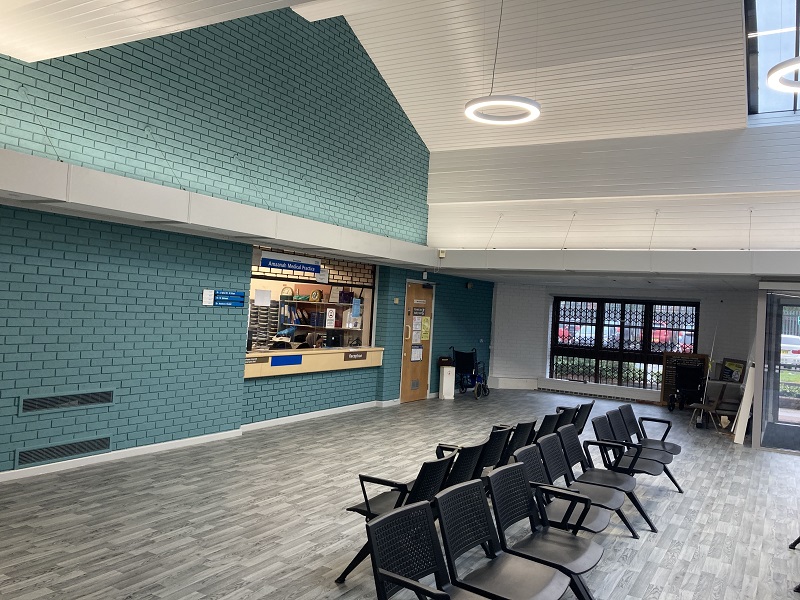An overhaul mandate
Outdated, dilapidated, and in need of investment – these were the challenges lobbied at the Government when it launched its Health Infrastructure Plan in October 2020.
And, since then, and through pandemic-inflicted challenges, a rigorous programme, dubbed ‘Project Speed’, has been implemented that aims to deliver 40 new hospitals across the UK by 2030.
As part of our commitment to deliver expertise to the healthcare sector, Pick Everard has been appointed to the NHS Property Services Framework.
Through this framework, we undertake vital maintenance services with local health centres and facilities, with improvements works that address site infrastructure, internal and external building fabric, and mechanical and electrical systems.
This programme of work, which forms part of our appointment to the NHS Shared Business Services (SBS) Framework, often goes under the radar amid wider industry overhaul, yet existing stock must continue to be fit for purpose, to ensure healthcare professionals can provide the best-possible care to patients in the region.
The funding announcement two years ago will have no doubt come as a huge relief for health centre managers, who were staring at huge costs to replace old infrastructure in need of urgent attention
This is evidenced by the fact that the NHS Property Services’ portfolio is one of the largest in the UK, comprising more than 3,000 properties, with 7,000 tenants across England.
At a total value of more than £3bn, this represents about 10% of the total NHS estate.
Part of our remit is to keep hubs of community health operational, particularly while occupied and during times of urgent care.
The pandemic has only shone further light on how integral our medical professionals and healthcare centres are to this mission, often opening or working for extended hours, or adapting in times of need.
For example, many local practices were reformatted as COVID vaccinations centres at the height of the crisis, balancing everyday care with dedicated support for national need.
And this places increased importance on components such as boilers, which power the everyday necessities crucial to these environments, including hot water.
Meanwhile, insulation and lighting maintenance ensures facilities can run safely and securely for every day or extended operations.
A funding shortfall
Most commonly, cost has been the biggest obstacle facing local authorities in the past.
The funding announcement two years ago will have no doubt come as a huge relief for health centre managers, who were staring at huge costs to replace old infrastructure in need of urgent attention.
Often, we are finding the facilities we are working with require not just big component changes, such as boiler replacement, but also everyday improvements that make a huge difference to modern healthcare standards.
Gutter cleaning, fire alarm replacement, and window repairs are elements that often go unnoticed, but play a huge role in ensuring healthcare facilities remain operational, particularly throughout the high-impact winter season, when these centres are most likely to be used.
Changes are also being driven by sustainability remits, with elements like LED lighting helping to not only brighten environments and cut carbon, but also reduce overhead costs in times of need.
Often, we are finding the facilities we are working with require not just big component changes, such as boiler replacement, but also everyday improvements that make a huge difference to modern healthcare standards
There is also the critical consideration that this is public money that is being spent.
When we undertake these projects, we must carefully consider our delivery programme against cost expectations, while placing ourselves in the shoes of patients and staff that occupy these environments.
Any work completed must be undertaken to the highest of standards, on time and on budget, or risk reputational damage for ourselves and the representing public authority.
The NHS Property Services Framework enables trusts to work with private suppliers to undertake vital maintenance services with local health centres and facilities
Setting regional standards
Improvements also have an influential nature across local authorities.
When speaking with clients, we find there is a clear drive to ensure each council’s respective communities are maintained and cared for through setting positive standards.
Cross collaboration or influence in this manner is only a constructive step, providing regional benchmarks for others to follow.
At NHS Estates 2023: Effectively Transforming the Healthcare Estate, one of the keynote speeches placed precedence on reviewing capital funding on the maintenance programme.
The emphasis here, quite rightly, is on ensuring no gaps are felt within communities, which can often feel aggrieved when funding is prioritised unevenly between districts, or in new areas of healthcare over existing, valued infrastructure.
Frameworks are implemented effectively when considered on the same philosophy that the NHS was first conceived on; collaboration, delivering long-term relationships that deliver multiple client gains
This is clear when we consider how morale plays a huge part in the delivery of these environments.
Patients arrive to our local health centres often in ill health or in some cases, in need of urgent treatment.
We must facilitate surroundings that aid feelings of wellbeing, rather than exacerbate health symptoms with underperforming works. Disability support, too, plays a role here, and we must always consider how our work can be updated and in line with modern regulatory standards, including ground-level services and walkway accessibility.
Amit Vadgama, Pick Everard’s principal building surveyor
Frameworks in delivery
Frameworks have been central to the effective implementation of the NHS maintenance programme.
As part of the wider NHS SBS Framework, this agreement has provided an efficient and flexible route to procure our services, which, crucially, could be called upon for both planned and ad-hoc requirements. It has been particularly effective for the maintenance programme, which could fluctuate depending on a building’s condition, or should it deteriorate rapidly and require immediate attention.
Furthermore, an increasing number of projects have been undertaken on the programme since it was first conceived, giving further precedence to the contract flexibility.
Put simply, appointing us as a consultant on a framework, such as this one, significantly reduces the time required to source services, a key driver when it comes to the immediate pressures of public health services.
Incremental improvements add up to a greater sum of their parts, and by taking the time to fix leaking roofs or inefficient lighting and heating/cooling systems, the sector is making small gains in the wider quest to overhaul the NHS Estates catalogue
Frameworks are implemented effectively when considered on the same philosophy that the NHS was first conceived on; collaboration, delivering long-term relationships that deliver multiple client gains.
For example, with our multi-disciplinary expertise, the local authorities helped through this framework have been able to benefit from our other service areas too, including structural and civil engineering – saving time, money, and effort in having to find a separate supplier, and, in turn, streamlining the use of public funds.
Where possible, the services of local SMEs have also been procured to help undertake the improvement works, giving back to the local community and in turn forming part of our over-arching commitment at Pick Everard to ensure 75% of our supply chain is made up of SMEs and micro suppliers.
A community-first approach
New facilities within the healthcare sector will always attract the headlines, simply due their inherent ability to start from scratch and build with forward-thinking technology front and centre of design approaches.
For example, many new healthcare facilities are incorporating green heating solutions, such as heat pumps, while no-touch technology has seen massive expansion from the lessons of the pandemic.
However, it is vital within the healthcare conversation that we do not forget about our local practices, and the hardworking professionals and patients they support.
Incremental improvements add up to a greater sum of their parts, and by taking the time to fix leaking roofs or inefficient lighting and heating/cooling systems, the sector is making small gains in the wider quest to overhaul the NHS Estates catalogue.
At Pick Everard, we continue to engage with local authorities on their healthcare requirements, driven by an ambition to deliver better together and collaborate on maintenance improvements that ultimately drive value at the heart of our communities, and build a safe and healthy future for all.
